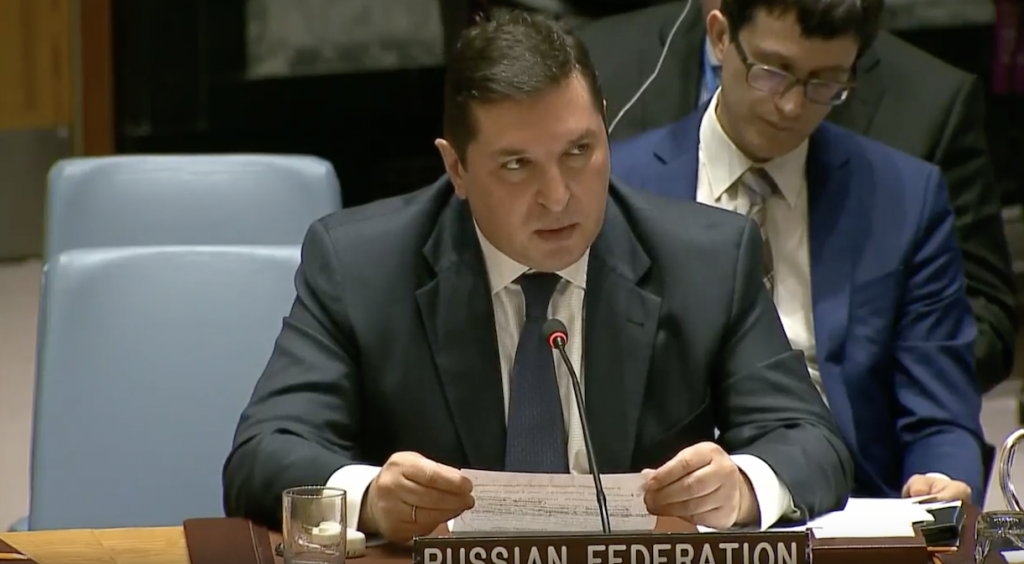Statement by Mr.Vladimir Safronkov, Deputy Permanent Representative of the Russian Federation to the United Nations, at the Security Council on the situation in the Middle East, including the Palestinian question
We would like to extend our gratitude to the United Nations Special Coordinator for the Middle East Peace Process, Mr. Nickolay Mladnenov, for the thorough briefing and for the efforts that he has undertaken.
We are deeply troubled by the escalation of tension in Palestinian-Israeli relations. We firmly and categorically condemn any manifestation of terrorism, which worsens the already difficult relationship between the parties and erodes the situation in the region as a whole.
We believe that a solution to the issue of Jerusalem, a sacred city for the three monotheistic religions, must hinge on General Assembly and Security Council resolutions. The specific parameters of an agreement on the city must be arrived at through direct Palestinian-Israeli negotiations. Prior to reaching such an agreement, the parties must refrain from any action that predetermines the final status of Jerusalem. In that regard, the aim of close coordination between Israel and Jordan is to help calm the situation at the holy sites in East Jerusalem and to maintain the status quo around them. The Hashemite Kingdom of Jordan plays a specific and important role in the management of Muslim holy sites.
The protracted pause in the peace process carries with it a high risk of further escalating the situation. The destabilizing factors have not been addressed; rather, they have worsened. Settlement activity is ongoing and, in recent days, in the occupied territories, including East Jerusalem, provocative rhetoric on both sides has been heightened.
The situation in the Gaza Strip requires specific attention. The humanitarian situation there remains dire. There are major disruptions in the provision of electricity. The unemployment level is among the highest in the world. What remains on the agenda is the need to provide for intra-Palestinian unity on the basis of the Palestine Liberation Organization platform and under the auspices of a legitimate Palestinian leadership. We support the mediation efforts of the parties, including those undertaken by the Arab Republic of Egypt.
The solution lies not only in stabilizing the current situation, but — and this is important — in paving the way for a genuine political horizon for an Israeli-Palestinian settlement through direct talks between the parties on the universally recognized international legal basis.
Russia helps to facilitate progress in the political process, acting both bilaterally and through the Middle East Quartet of international mediators, which we view as a critical mechanism and which has been endorsed by Security Council resolutions. We are keen to further contribute to upholding unity within Palestinian ranks. We reaffirm our initiative on conducting a meeting in Moscow between President Abbas and Prime Minister Netanyahu.
Our position was and remains steadfast: a comprehensive, fair and lasting peace can be achieved exclusively through the relevant international legal instruments, including Security Council resolutions as well as the Arab Peace Initiative, and through direct talks between the parties, without preconditions. Such negotiations must lead to a cessation of what began in 1967, namely, Israel’s occupation of Arab lands, and to the establishment of an independent, viable and contiguous Palestinian State, coexisting side by side in peace with Israel and within secure and recognized borders, with East Jerusalem as its capital, and with West Jerusalem becoming the capital of the State of Israel.
We see no alternative to the two-State solution. That is the sole realistic means to put an end to the Palestinian-Israeli confrontation and to mutual recriminations.
The Middle East and North Africa region remains in crisis — old crises and new crises. The most recent wave of instability in the occupied Palestinian territories only confirms this lamentable reality.
There are still terrorists in many parts of the region and beyond, despite the gains in combatting terrorism, who seek to gain possession of chemical weapons.
Once again, last night the Russian Embassy in Damascus was shelled twice. We call upon our partners to condemn such attacks.
We once again call attention to the fact that the destabilization of the situation in the Middle East and North Africa has significantly disrupted the fragile ethno-religious balance that has historically prevailed in the region. Extremists have exploited this religious factor, thereby unleashing a veritable genocide against Christians and other minorities with one end in mind: to stoke hatred and to swell their own ranks.
All of that serves to bolter our position in favour of concerted efforts on the part of the international community to forge genuine cooperation and build a wide-ranging counter-terrorism front to effectively repel the global terrorism threat, including depriving terrorists of access to chemical weapons and other types of weapons.
It is axiomatic that, in parallel with counterterrorism measures, we must takes steps for a political settlement to the myriad conflicts and to restore peace and stability in the Middle East and the North Africa region.
With respect to resolving the crises in the Middle East, Russia has steadfastly called for a political and diplomatic process, for which there is no alternative, one that hinges on inclusive national dialogue. We continue to focus efforts on achieving effective and enduring results and will continue urging the belligerents to overcome the mistrust, without imposing any external solutions, in order to seek a political settlement. It is our hope that our partners share that approach.
We reaffirm our position in favour of respect and upholding the independence, sovereignty and territorial integrity of all States. Efforts to settle regional crises must be premised on diplomacy, dialogue and engagement. History attests to the fact that with goodwill even the most intractable crises can be settled.
We call upon all international and regional players to overcome their differences and disagreements on an equal footing, without counter-productive rhetoric or mutual recrimination, in order to demonstrate a constructive position and self-restraint and seek mutually acceptable solutions. On that basis, we stand ready to work collectively.
